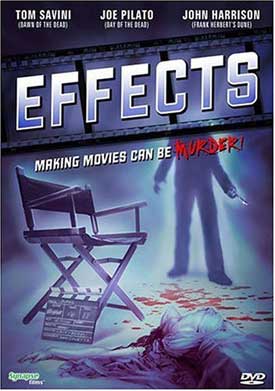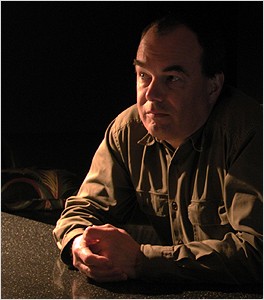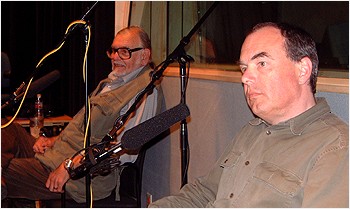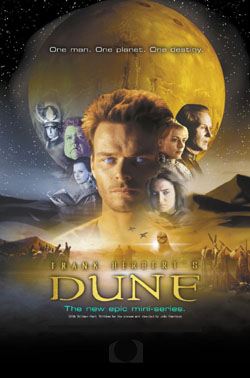 Originally released in 1980, Effects
Originally released in 1980, Effects
has been missing in action for decades. It’s a low budget horror film
that’s of particular interest to fans because it was made by the
Pittsburgh movie mafia that hung around with George Romero, and the
film stars Joe Pilato (best known as Captain "Choke on ’em!" Rhodes
from Day of the Dead)
as a special effects guy who finds himself caught up in the making of a
snuff film. Tom Savini stars as well, in full on hyperactive mode.
The
movie disappeared for a long time, but it’s now out on DVD thanks to
Synapse films, complete with a truly fantastic special edition that
includes a commentary and an hour long documentary called AfterEffects.
Last week I had a chance to talk to John Harrison, who both produced
the film and starred in it as the creepy snuff director. John’s had the
kind of career that seems so cool to me – he was Romero’s assistant
director; he was the Screwdriver Zombie in Dawn of the Dead; he composed the music for Day of the Dead; he wrote and directed the SciFi Channel Dune miniseries and wrote Children of Dune; he directed the Tales from the Darkside movie – and so much more. Seriously, just check out his IMDB page and prepare to be amazed.
John
gave a great interview, and you’re about to read not only his
recollections of the old days in Pittsburgh, but also his hopes for the
future of the Dune franchise, his upcoming collaborations with Clive Barker, and a very interesting hint about the future of Romero’s Dead films.
Effects is out on DVD now, and you can buy it through CHUD by clicking here!
Q: Why was Effects gone for so long? There are so many other low budget films that are much worse than Effects that keep making the rounds, but this good little movie disappeared for twenty some odd years.
Harrison:
It’s ironic that the fact that it has been lost so long has in a way
given it a new life because there’s been an urban legend built up
throughout the years with people who know the Romero group of us and
the whole Pittsburgh scene from back there who wonder what happened to
it. That is how it came to fall into the hands of Synapse. They came to
me and asked me the question and said they had some people they know
and one thing led to the next.
The
short answer is that it was partly a bad distribution deal. When we
finished the film we made an initial distribution deal with a small
company. Through no fault of their own they just didn’t have the
resources to promote it properly so it had a very limited theatrical
run. Once that was over the company wasn’t able to pursue it in any
other way. Back then, if you remember, there really wasn’t a home video
industry. This was back in the early 80s and there were battles between
VHS and Beta and Blockbuster didn’t exist. It was all little video
clubs and stuff like that.
When
that particular distribution deal lapsed in the early 90s, we wanted to
make another distribution deal with a small company that was going to
try to put it out on home video. Again, they were just unable to do it
and frankly I couldn’t interest anybody in it for a while. Unless it
had big stars or was a big hit in theatrical release – really it wasn’t
until the end of  the
the
90s when the DVD market really exploded with all of these more targeted
releases, these more cult films, specific kind of genre movies that
found their own niche in small release patterns. Companies like Synapse
have grown up in their wake and been able to find their own niche as
well in distributing these kinds of movies. We were lucky to find
Synapse. We were never going to be able to take this to Warner Home
Video or Universal – the movie was too old at that point and it didn’t
have any big stars in it.
Q:
Synapse also gave you guys a great DVD. You have an excellent
documentary on the DVD, where all the guys involved in Effects,
including George Romero, get back together and talk about the making of
it. Had you guys all been in touch over the years?
Harrison:
Oh yeah. I was George Romero’s assistant director all through the 80s
and I did the score on his movies. Pat Buba was his editor. We always
hang out. I go back to Pittsburgh because I still have family there.
George and Chris and me and my wife get together out here on occasion.
George and I have several projects in development together. We’ve all
been friends and keep in touch.
The
interesting thing about that documentary is that the fellow who
introduced me to Synapse’s Don May, Michael Felscher, is the guy who
did that documentary. When Don wanted to put this together he called me
and said, ‘We’d like to make this a collector’s edition and put some
extras on it, what have you got?’ I said we could do the commentary and
I could out to Pittsburgh and here in California I could get people
together and we could shoot interviews with everybody who had something
to do with it. We dumped all that on Michael’s lap. He came up with the
idea of Pittsburgh in the 70s and that whole independent film era and
came up with that great documentary. We’ve screened it a number of
times – the film and the documentary – and people like the documentary
as much as they like the film.
Q:
The documentary is really great. It’s just fascinating to see some kind
of regional, independent filmmaking turn into a real thing for people.
What’s most impressive is that you guys came out of Pittsburgh, which
isn’t a film town, and you’ve all gone on to have Hollywood careers
since.
Harrison:
That is the great thing about what that documentary portrays. Back
then, as we say in the documentary, you didn’t come out of film school
or any industry training. Pittsburgh was a steel town, not a film town.
If you wanted to be in that business, you found like minded individuals
and you got together almost like a band – you’ve got a guitar so you’re
the guitarist, you’ve got a bass so you’re the bassist, you got a
camera so you’re the cinematographer, you can act so you’re in it – and
you basically just did everything. It was a wonderful training ground.
And
you know the thing is, that was going on all over the country back
then. There were no credit card movies because credit cards didn’t
exist to do that kind of thing and there weren’t little DV cams where
you could just make a movie on your computer. What you found were these
little clusters all over the country of people who just wanted to make
movies. There was us in Pittsburgh with George; Wes Craven was doing
his thing in New Jersey before he moved out west; Tobe Hooper down in
Texas; Sam Raimi up in Detroit; and there were all these clusters of
people just basically saying, ‘We can do that!’ Really just on a hope
and a prayer and faith we’d go off and do these things, and have a great time.
prayer and faith we’d go off and do these things, and have a great time.
Q:
One of the interesting things about the film is that it feels really
modern. While it definitely looks and feels like it was made in the
late 70s and early 80s, storywise and thematically it’s incredibly
current.
Harrison:
I’m really pleased you say that because I have always felt that way. I
don’t want to sound pretentious but I think to some extent the film was
ahead of its time. You look at reality television now and what’s going
on with television shows, with the internet, with mobile casts on your
cellphone. What they’re talking about in the story of the movie is very
much what’s going on now – what’s the reality between reality and
fiction, and if you don’t know the difference, is there a difference?
At
the time we were also talking about that in relation to special
effects. Director Dusty Nelson says this so articulate in the
documentary – effects were getting so good (and this has been
completely proven with CG and everything else) that you really can’t
tell the difference. I just saw Saw II,
I know Emanuelle Vaugier, and that scene where she’s trying to get the
syringe and she puts her hands up through the glass – there’s no way
that isn’t real. Of course I know it isn’t real, I just saw Emanuelle
and she’s still alive! But you get to the point where the line is so
thinly drawn, and you’re right, the issues and themes are still
contemporary.
Q: Hollywood is so into doing remakes now – how would you feel about a remake of Effects?
Harrison:
The thought has crossed our minds. Right now what we’d love to do is
see this get out there so that everyone who is a fan of the genre could
see and enjoy what we did.
But
no, I would consider remaking it. Dusty and I were having a great laugh
about this the other day, because there are those scenes where they
pull the pictures off the wall and you see the hidden cameras. Of
course back then the cameras were huge, and you’d have to circle the
globe with your hidden cable to do what is supposedly being done. Right
now you could do the movie and record it with your cellphone, or your
little DV cam. The reality today is that it would be very easy [to make
that snuff film]. I think we’ll have to see how it does.
The
other thing is that, for all of its creepiness, it’s not a really gory
movie. I don’t know how the audience would take to it these days with Saw II and Land of the Dead and very graphic kinds of movies. I’m not sure how it would do.
Q: It’s not really graphic, but that snuff film scene still has a real punch. It looks real.
Harrison: That’s the idea. And we’ve had people tell us we’re lying when we tell them it’s not real.
Q: That’s a compliment.
Harrison: Yeah!
We’ve had a lot of controversy about that. We were lambasted at certain
film festivals. At the US Film Festival, which became Sundance, we were
almost ran out of town on a rail – for a lot of reasons, but that
particularly offended people. But it’s there for a very good reason.
 Q: You wrote the first two Dune miniseries for SciFi Channel, and directed the first. Is there more Dune in the future?
Q: You wrote the first two Dune miniseries for SciFi Channel, and directed the first. Is there more Dune in the future?
Harrison:
I would love it if there were. Richard Rubinstein, the producer, and I
would love to keep the franchise going. I have a great relationship
with the Herbert family and they love what I’ve done.
I’ve
tried to talk the SciFi Channel into doing a series, which would take
place during what I call the lost years, which are between the books Children of Dune and God Emperor of Dune.
There’s a vast area of time that we could create an original series
around use the original characters that everybody loves. There are also
the prequel books, but SciFi doesn’t want to do it, by the way.
Q: Is it a cost thing?
Harrison: I don’t think it’s the cost at all. I think it’s just creative. They have Battlestar Galactica and they don’t want to be branded as the in space kind of SciFi Channel. Although I don’t think that’s what Dune is. Talk about material that reflects contemporary issues – if Dune isn’t that thing, I don’t know what is.
So
we’re talking about maybe doing it as straight to DVD and going
straight to the fans. People could collect these like books, which
would be great. We’re also talking about the prequel books which Brian
Herbert and Kevin Anderson created. There has been some talk about
remaking the original book, and I guess you would call it remaking
David Lynch’s movie. But I wouldn’t be particularly interested in that
– I think I’ve done that.
So yeah, the short answer is that I hope there’s more Dune
in the future. I love the books and I’ve read them all, and I have all
kinds of ideas for how we could continue to keep that material alive.
Q: You’ve also been working with Clive Barker.
Harrison: I adapted his Abarat
books for Disney, which are currently stuck in contract negotiations,
so I don’t know what’s going to happen with that. He and I really enjoy
working with each other and I’m about to start an adaptation of one of
his Books of Blood stories for a series of movies that they’re making.
Q: Which story?
Harrison: Book of Blood.
I’m going to do the first one. We’re going to turn that into a movie
which I hope to direct. Clive and I have been looking for ways to keep
working with one another. He was very happy with the adaptation of
Abarat, and I was happy that he was happy.
Q: Is that live action or animated?
Harrison:
It would be a combination of both, and that’s why it’s tricky. It’s
going to be ba hugely expensive movie and I don’t know if Disney is
ready to plop down the money at the moment. We took the first Abarat
books – there are four of them, or there will be four of them – and I
took the first two and created the screenplay. It’s wonderful. It’s
magical, it’s fun, it’s got great characters. All the paintings of the
great characters Clive imagined come to life in this.
Q: You mentioned that you had some projects you were working on with George Romero. Can you talk about them?
Romero. Can you talk about them?
Harrison: I can’t talk about them too much because they’re in the nascent stages. He’s got a wonderful adaptation of Dracula
which we would love to do. It’s the original book completely as Stoker
wrote it. We had that set up at ABC. I don’t know what we’re going to
do with that now.
There
are a couple of smaller projects, including one that could be really
fun. I can’t talk too much about it, Devin, unfortunately, but what I
can say is that it remains in the world he is known for and it would be
a new DVD franchise.
Q:
Very interesting! And it’s interesting that you keep mentioning direct
to DVD stuff. A couple of months ago I interviewed Joss Whedon and he
said that they had come to the conclusion that they would probably
continue his Buffy and Angel
franchises as direct to DVD films. I think that’s there a change going
on, isn’t there, in how that direct to DVD stuff is viewed.
Harrison:
Definitely, and it’s not just DVD. It’s what I call on demand. What it
means to me is we now have got the technology whereby people can get
material directly for themselves, whether it’s TiVo’d off some
telecommunications device by cable or by satellite or by the big
broadcast networks; whether it’s buying a DVD out of a store like you’d
buy a book; whether it’s downloading it to your computer – the whole
way we consume entertainment is completely changed. I don’t think
people realize how much it’s already changed and how much it will
change.
People
like my kids, they don’t look at the way I looked at. It’s not about
going to a facility and being delivered it; it’s when you want it you
go get it. For Joss’ stuff, there’s a fanbase there, why shouldn’t he
continue to feed it? Why does he need the intermediary of Universal
Pictures or NBC to have to pony up the money? Why not just make it and
sell it directly to the fans?
Q:
And with George’s stuff you could aim something right at the fans, not
having to worry about appealing to larger audiences, and you could get
around the censorship.
Harrison:
Yeah. I think the economics are different – you have to be able to make
it for the money. It’s not like you’ll have 150 million dollars for King Kong. You’ll have to be able to make it for a price.
Q: That’s 207 for King Kong now.
Harrison: I
was being charitable! [laughs] If you have a brand name, so that you
cut through the noise, or if you have an established fanbase, like Joss
does with Serenity or Buffy,
then why not just continue to make them? Until the fans tire of it or
don’t want to see it anymore. I would think we could do that with Dune.
Here’s the biggest selling scifi book in history, with millions and
millions of copies in every language in the world – why wouldn’t we be
getting those DVDs out there with whatever advertising we can? I think
that’s a business!
Q: Would you miss the cinematic experience though? Do you think movie theaters would be phased out?
Harrison:
I don’t think that will ever happen. I don’t think these are mutually
exclusive ideas. Has television ruined the movie business? No, but when
television came out, everyone said, ‘Whoops, that’s the end of the
movie business.’ It wasn’t so.
The
movie business will change, I think. It already has over the last
thirty something years. It’s become blockbuster-driven. Yet there are
still venues for modestly budgeted pictures. People will always love to
go sit in a movie theater. I don’t see that ever changing. I don’t see
it as one killing off the other.
Q: Is there anything else you have coming up?
Harrison: I’m ever hopeful that my Painkiller Jane
series at SciFi will go. We just don’t know at this point. The pilot
will air on December the 10th, and it’s very good. Emanuelle Vaugier is
in it, one of the stars of Saw II. A wonderful young actor named Eric Dane is in it, and Richard Roundtree, Shaft.
It’s
a wonderful cast and it’s a great concept. What we have in mind for the
series, in terms of the themes and the issues we’re going to get into –
it’s not just a kick-ass La Femme Nikita
superhero, it’s going to deal with scifi now in terms of genetics and
evolution and biomechanics and nanotechnology, and all of the things
that are happening now. All in the form a great superhero TV franchise!